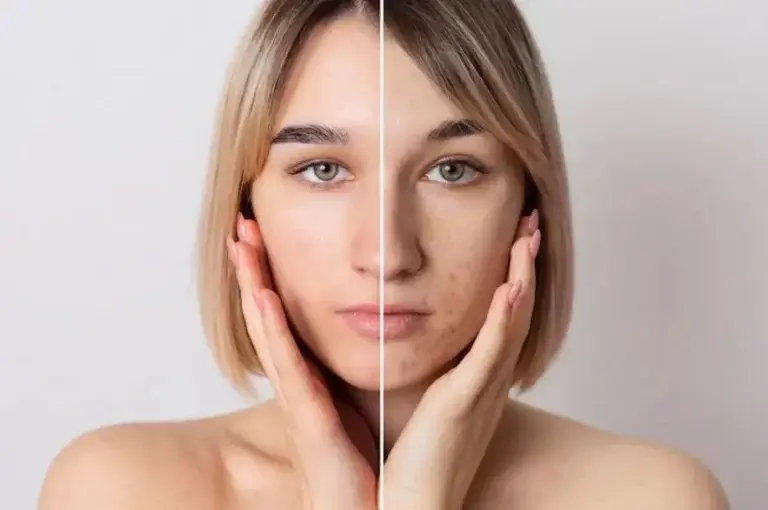Breakouts and itchy skin are frequently blamed on sensitive skin.
This article describes the characteristics of sensitive skin and how to identify them.
This page also includes information and advice on how to properly care for sensitive skin, to reduce sensitivity, and increase skin resilience.
Many people claim to have sensitive skin when they break out after using a certain product or being exposed to the sun.
However, most of the time, the causes behind blotchy skin and zits are improper skin care products and terrible skin habits.
Whether you are one of the many people who break out or itch after being exposed to the sun or using a product, it is a good idea to evaluate whether sensitive skin is the cause or if something else is at work.

How can you know if you have sensitive skin?
Sensitive skin is often thin, with visible broken capillaries under the skin’s surface.
Fine pores are also characteristic of sensitive skin.
Sensitive skin readily reddens when subjected to mild temperature fluctuations, whether from cold or heat.
When exposed to dirt or even moderate-strength skin care products, sensitive skin tends to rash quickly.
If your skin exhibits these symptoms, chances are you have sensitive skin.
A dermatologist appointment is necessary for a full skin examination.
Because caring for sensitive skin can be tough, it is best to minimize your usage of skin care products.
Simple skin care regimes are generally more effective for sensitive skin since they avoid product overload.
skin care focuses on skin strength to minimize sensitivity and enhance tolerance.
What is the best way to care for sensitive skin?

Dryness is a risk factor for sensitive skin, which can lead to greater sensitivity.
Drinking eight glasses of water each day and using a lightweight, hypoallergenic moisturizer on a daily basis will help repair your skin’s moisture or lipid barrier, which serves as a defense mechanism against allergens.
2. Consume skin-friendly foods.
Fruits, vegetables, and other water-rich diets are crucial for skin imbalance correction.
These meals’ vitamin, mineral, and water content moisturize and revitalize your skin.
Spicy foods, as well as alcohol and caffeinated drinks, might, on the other hand, make your skin more sensitive.
3. Avoid excessive sun exposure.
Sun exposure can easily cause sensitive skin to redden and burn.
Apply sunscreen to your face and sunblock lotion to your body before heading out in the sun.
You may apply the same protection on your lips to keep them from darkening.
Under your lipstick or gloss, use an SPF-rich lip balm to help protect your lips.
Umbrellas, sunglasses, and hats shield your skin, eyes, and face from excessive sun exposure.
4. Always keep your skin protected.
Even while you’re indoors, your skin requires protection.
If you are staying in an air-conditioned or heated room, use a mild moisturizer on a regular basis.
This will keep your skin from drying out as a result of the high temperatures.
5. Avoid items with artificial colors and scents.
Colorants and perfumes are exclusively used in skin care products to increase their commercial appeal.
These additives provide no benefit to your skin.
They frequently trigger allergic responses and enhance the sensitivity of your skin.
Aside from these suggestions, it is also a good idea to switch to skin care products designed specifically for sensitive skin.
A complete skin evaluation and consultation with a dermatologist can uncover skin care strategies and products that can help strengthen and reduce the sensitivity of your skin.
Conclusion
Looking for affordable skin treatments in Manhattan Beach, CA?
Contact Body Therapy and Skin for all your skin and body treatments.
Www.BodyTherapySpa.com
424-262-1327


